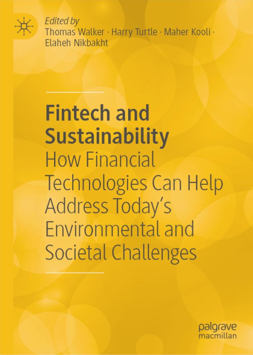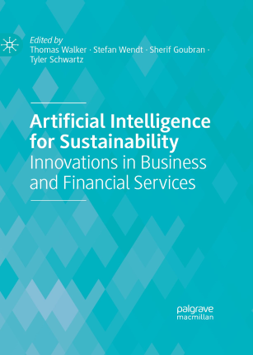Books

Fintech and Sustainability: How Today’s Technologies Can Help Address Today’s Environmental and Societal Challenges
Editors: Walker, T., Turtle, H., Kooli, M., & Nikbakht, E.
© Palgrave MacMillan, 2023
Financial technologies (fintech) can improve sustainability, influence policies, and require new regulations. Climate change, water pollution, and non-renewable resources management can all be addressed with fintech innovations. Despite the advantages offered by fintech, opponents warn of potential negative consequences. The application of fintech in sustainability is a double-edged sword requiring further investigation.
This book provides an overview of fintech applications and considers their impact on the future of sustainable finance. It explores how financial technologies can enhance the sustainability of investment and corporate decisions and contribute to the fulfilment of the Sustainable Development Goals (SDGs). By considering practitioner and academic views, it examines whether and how fintech can improve sustainable practices, potential threats with possible solutions, and policies and regulations designed to improve sustainability benefits.
View this book on SpringerLink
Artificial Intelligence for Sustainability: Innovations in Business and Financial Services
Editors: Walker, T., Wendt, S., Goubran, S., & Schwartz, T.
© Palgrave MacMillan, 2024
In light of the climate crisis, businesses are expected to embrace sustainability to reduce their negative impacts on the environment and society, while at the same time strengthening their organisations’ positive impacts. Managing this alongside the traditional requirements of business requires careful handling, and it is small wonder that some are heralding the advantages posed by artificial intelligence (AI) as the missing piece of the puzzle.
This edited book aims to present a balanced discussion of the benefits and costs of using AI for the natural environment and society, including an analysis of its potential to help meet the UN’s Agenda 2030 and the Sustainable Development Goals. Researchers, practitioners, regulators, and entrepreneurs at the forefront of sustainable AI solutions share insights into the different sustainable applications of AI and highlight how these new developments may affect and contribute to our fight against climate change and address further environmental and social challenges. This volume will be of great interest to scholars and students of digital business and new technologies, sustainability, and strategy.
View this book on SpringerLink